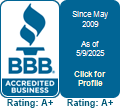
If you’re uncertain whether your West Valley City house has unhealthy indoor air quality (IAQ), it likely does.
We are indoors a lot. In fact, we’re in a building up to 90% of the time, according to the U.S. Environmental Protection Agency. And the air inside residences could be 2–5 times more polluted than outdoors, which may create long-term health issues.
Most Common Origins of Poor IAQ
We’ve made a list of the most ordinary origins of poor IAQ, the troubles they cause and how you can fix these indoor air pollutants. If you’re worried about the air inside your house, we suggest chatting with a specialist like Select Comfort Systems about which solutions are best for your house.
Volatile Organic Compounds
Volatile organic compounds, or VOCs, are vapors released by common household products.
They’re found in paint and stains in addition to:
- Furniture
- Carpet
- Building materials
- Cleaning products
- Cosmetics
- Air fresheners
- Candles
When these fumes accumulate inside, they may irritate your eyes, nose and throat. They can also result in headaches and nausea. Regardless of whether your house is in a rural or industrial space, an EPA study found indoor levels of these fumes can be 2–5 times higher than the air outside.
Always adhere to the manufacturer’s directions when using paint or cleaning supplies. Cracking a window can help chemicals dissipate faster.
Air purification systems can also improve your air. This equipment partners with your heating and cooling equipment to freshen indoor air. When looking for one, ensure it’s specifically created to eliminate VOCs.
Dust and Pet Dander
Dust and pet dander can trigger health problems like asthma and allergies, especially when it continually gets recirculated by your residence’s comfort system. While you can vacuum more routinely and buy an improved air filter, an air filtration system could be a better fit.
This unit hooks to your heating and cooling equipment to deliver mighty filtration. Some types provide hospital-level filtration for getting rid of particles and bioaerosols.
Lingering Odors
New residences are closely sealed to enhance energy efficiency. While this is good for your utility costs, it’s not ideal for your IAQ.
Musty odors can stick around for a greater amount of time as your house is pulling in a smaller amount of fresh air. As keeping your windows open all the time isn’t doable, here are two approaches you can make your indoor air smell better.
An air purification system is installed in your HVAC system to neutralize odors before they get released again. Look for one with a carbon filter and the power to break down dangerous VOCs. This equipment can also help keep your loved ones healthy by wiping out most bacteria and normal allergy triggers like pollen and mold spores.
A ventilation system pulls out stale indoor air and substitutes it with crisp outdoor air. There are two models of equipment (heat recovery and energy recovery), so call our professionals for more information on which type is right for your residence.
Unsteady Humidity
It’s critical your house’s humidity stays even. Air that’s too humid can cause mold, while dry air can lead to respiratory troubles.
Our technicians suggest 40–50% for ideal comfort. To keep yours steady, think about getting a whole-home humidifier or whole-home dehumidifier with your HVAC system.
Rather than having to drag a humidifier from room to room, this equipment delivers even humidity throughout your house.
Carbon Monoxide
Carbon monoxide is colorless gas you can’t smell. It occurs when there’s insufficient combustion in fuel-burning equipment, like gas heating systems, water heaters or fireplaces.
It creates an extreme health risk. In small levels, it can lead to flu-like symptoms like headaches and nausea. It could be deadly in big levels.
We suggest regular furnace maintenance to ensure your unit is operating like it should. This service allows our specialists to see troubles before they get bigger, including malfunctions that can cause carbon monoxide leaks.
The best way to keep your residence free of carbon monoxide is to install detectors. These alarms should be on every floor by bedrooms and living spaces.
Enhance Your Residence’s Air Quality with the Select Comfort Systems Experts
Informed that your house has poor air quality but not sure how to improve it? Or unsure which solution is right for you? Give our approachable HVAC pros a call at 801-305-4777 or contact us online today. With free estimates and expert support, we’ll help you choose the right option for your needs and budget.

